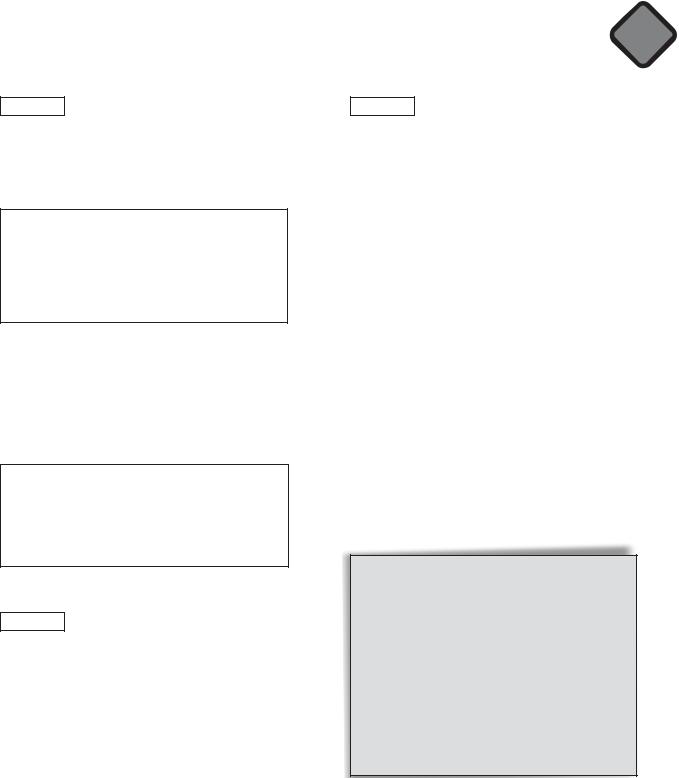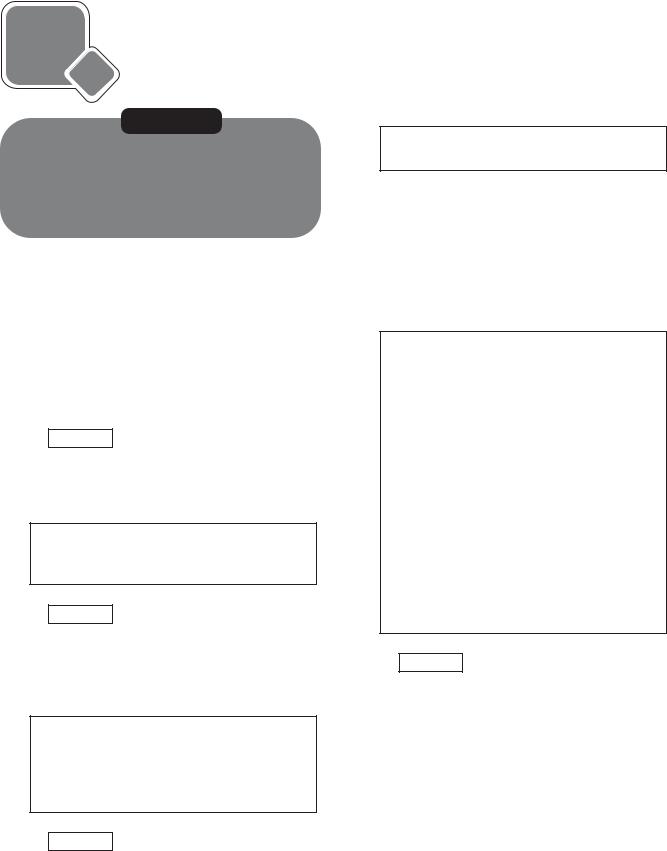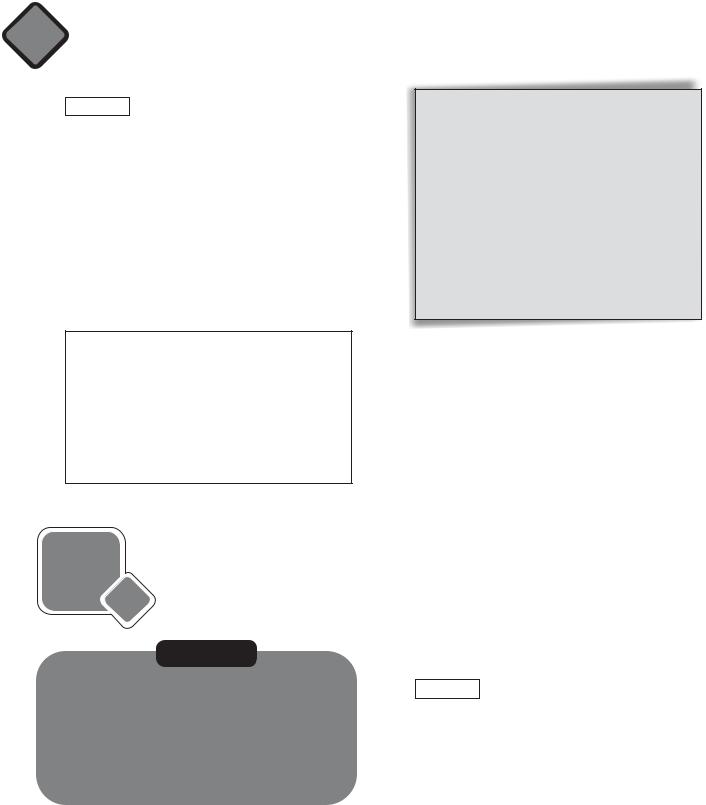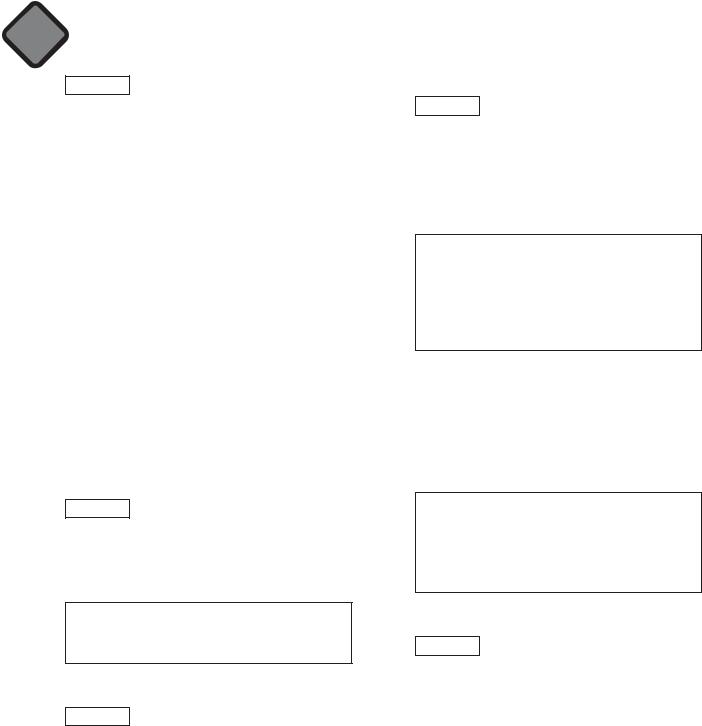
Sportlight_7
.pdf
Reading
3Focus Reading for specific information
ñAsk Ss to read and listen to the text and to say what the underlined words refer to. Allow Ss time to do the task individually. Ss compare answers. Check answers.
Answer Key
They |
― magazines |
They |
― teenage boys |
They |
― writers for teenage magazines |
This |
― the informal language used in the |
|
magazines |
ñAsk Ss to explain the words in bold without the use of a dictionary, i.e. they can use synonyms, paraphrase etc. Elicit/Explain the meanings and write them on the board. Ss should copy the words into the vocabulary section of their notebooks.
Answer Key
popular (adj): fashionable glossy (adj): shiny
instead (prep): as opposed to attractive (adj): popular
Speaking
4Focus Discussing preferences
Ss work in groups. Ask Ss to think about their favourite teenage magazines and why they like them. Ss discuss their ideas. Go around the class monitoring Ss’ work and helping where necessary. Ask individual Ss from different groups to tell the class about what they discussed and stimulate further class discussion.
(Ss’ own answers)
Culture Corner 4d
Project
5Focus A survey
ñSs work in groups. Go through the rubric with Ss and elicit key words (survey, favourite teenage magazine, boys, girls, your class). Elicit/Explain what Ss have to write. You can use the questionnaire below.
What kind of magazines do you read? |
..... |
How many magazines do you buy every |
|
week? |
..... |
What do you like most in teenage |
|
magazines? |
..... |
Do you find the problem pages useful? |
..... |
Do you discuss these magazines with |
|
friends? |
..... |
|
|
ñAllow Ss some time to complete the task in class. Ss can go around the class asking fellow Ss. Go around the class monitoring Ss’ work and helping with any difficulties. Ask an individual from each group to present their findings to the class. Give feedback.
(Ss’ own answers)
Synergy
ñAllow Ss one minute to think of ten words they have learnt in today’s lesson. Ask Ss to use them to make their own sentences.
ñWhen Ss have finished ask them to get up and go around the class to find a partner who has something in common with them e.g. same hair/eye colour, same clothes, same taste in music, etc.
ñAsk Ss to discuss what they have learnt in the lesson with their partner.
61

4 English in Use
Reading & Listening
1Focus Stimulating interest
Draw Ss’ attention to the TV guide. Ask Ss where they think you could find it. Ask Ss to look closer and say what kind of programmes you can watch. Ask Ss if they have similar programmes in their country. Stimulate discussion about TV in their country adapting your questions according to Ss’ responses.
Answer Key
You can watch the news, a documentary, a police drama, a soap opera, sports, a cookery show, a quiz, a chat show, a music show, a comedy, and a reality show.
2Focus Listening and repeating
Read the rubric and explain the task. Read the sentences with Ss first and explain any unknown words/meanings. Play the recording (twice if necessary), pausing after each phrase.
|
Answer Key |
|
|
|
|
|
|
|||
|
1 |
S |
3 |
D |
5 |
A |
7 |
S |
9 D |
|
|
2 |
S |
4 |
D |
6 |
S |
8 |
A |
|
|
|
|
|
|
|
||||||
|
|
|
|
|
Listening for specific information |
|||||
3 a) |
|
Focus |
||||||||
Ask Ss to read the dialogue and to say who wants to watch the listed programmes. Allow Ss time to complete the task. Go around the class monitoring Ss’ work and helping if necessary. Ss compare answers. Check answers with class.
Answer Key
Reality show – Becky
The News – Sam
A documentary – Pete, Julie
Sports programme - Pete
A soap opera - Julie
b) Focus Reading out a dialogue
In pairs, Ss read out dialogues.
(Answer as dialogue)
Speaking
4Focus Discussing TV programmes
Ss work in pairs. Ask Ss to look at the TV guide in Ex. 1 again and to discuss which TV programmes they want to watch. Remind Ss to use the phrases in Ex. 2. Allow Ss time to prepare and to practise and then ask pairs to act out their dialogue for the class. If possible, record dialogues. Correct pronunciation and any mistakes and give feedback.
(Ss’ own answers)
5Focus Forming adjectives
ñRead the rubric and explain the task. Go through the box with Ss and check understanding. Allow Ss time to complete the task and check the words in their dictionaries. Ss compare answers. Check answers.
Answer Key |
|
|
|
1 |
enjoyable |
4 |
insistent |
2 |
different |
5 |
considerable |
3 |
believable |
6 |
sensible |
|
|
|
|
ñAsk Ss to make their own sentences using the adjectives. Allow Ss time to complete the task. Ss compare answers. Ask a few Ss to read their sentences to the class.
Suggested Answer Key
We had a very enjoyable day at school today. There are many different TV programmes on satellite TV.
Jack is a very sensible boy. etc.
Pronunciation
6Focus Pronuncing /e/, /±/, /ea/
ñFocus Ss’ attention on the phonemes chart in the appendix. Ask them to find the three symbols. Pronounce the sounds clearly and slowly. Demonstrate where your tongue, teeth and jaw are positioned for the sound. Ss listen and repeat. Drill sounds around the class. Read the rubric and explain the task. Play the recording. Ss listen and tick the correct boxes. Ss compare answers. Check Ss’ answers and correct any mistakes.
62

English in Use 4
Answer Key
|
/e/ |
/±/ |
/≈/ |
|
/e/ |
/±/ |
/≈/ |
belly |
|
|
|
lad |
|
|
|
Harry |
|
|
|
ferry |
|
|
|
fairy |
|
|
|
barely |
|
|
|
marry |
|
|
|
dairy |
|
|
|
|
|
|
|
|
|
|
|
ñBrainstorm for other words with these sounds. Ask Ss to look at the unit wordlist at the back of the book for examples.
Suggested Answer Key
/e/: tell |
/±/: bad |
/≈/: hairy |
Extensive Reading |
4 |
|
|
1 a) Focus Stimulating interest
Draw Ss’ attention to the pictures and ask them what they think the students are doing. Elicit ideas from around the class and stimulate discussion.
Suggested Answer Key
I think the students are working in a radio station. Maybe they are reading the news or doing an interview.
b)Focus Matching titles to paragraphs
ñAsk Ss to read the article again and to match the headings to the paragraphs. Read through the titles first with Ss so they know what to look for. Allow Ss time to complete the task. Ss compare answers. Check answers.
Answer Key
1 C |
2 B |
3 D |
4 A |
|
|
|
|
|
|
ñ Ask Ss to explain the words in bold without |
||
b) |
Focus |
Stimulating interest in topic |
|
|||||
|
the use of a dictionary, i.e. they can use |
|||||||
|
|
Ask Ss if they listen to the radio and if so what |
|
|||||
|
|
|
synonyms, paraphrase etc. Elicit/Explain the |
|||||
|
|
kind of shows they like. Elicit responses from |
|
meanings and write them on the board. Ss |
||||
|
|
around the class and stimulate discussion, |
|
should copy the words into the vocabulary |
||||
|
|
adapting your questions according to Ss’ |
|
section of their notebooks. |
||||
|
|
responses. Elicit words related to radio. |
|
|
|
|
||
|
|
|
|
|
|
|
|
|
|
|
(Ss’ own answers) |
|
Answer Key |
|
|||
Reading & Listening |
|
chart hits (n): popular songs |
|
|||||
|
breaks down (phr v): stops working |
|
||||||
|
|
Predicting content |
|
controls (v): manages |
|
|||
2 a) |
Focus |
|
|
|||||
|
|
Ask Ss to look at the title of the article and to say |
|
|
|
|
||
|
|
what they think it is about. Elicit answers from |
3 |
Focus |
Matching jobs to descriptions |
|||
|
|
around the class. Ss listen, read and check. |
Read the rubric and explain the task. Go through |
|||||
|
|
|
|
|
the words and descriptions first with Ss and check |
|||
|
Suggested Answer Key |
|
understanding. Allow time for Ss to complete the |
|||||
|
The article is about UK university students who |
|
task. Ss compare answers. Check answers and write |
|||||
|
have their own radio stations. |
|
them on the board. |
|||||
|
|
|
|
|
|
|
|
|
63

4 |
Extensive Reading |
|
|
Answer Key
DJ ― the person who presents the show and plays music
Journalist ― the person who writes and then reads the news
Producer ― the person who organises everything and controls the show
Engineer ― the person who fixes the equipment when it breaks down
Speaking
4Focus Listen to a radio programme
Suggested Answer Key
ñIt starts with a greeting.
ñIt presents:
1 a quick update on a basketball game.
2 the Fire Service Chief’s retirement.
3 the traffic today.
Project
5Focus Creating a radio programme
Ss work in groups. Go through the rubric with Ss and elicit key words (short radio programme, latest school/local news). Tell Ss to choose one of the four positions for each member of the team and to distribute the tasks. There should be 2 journalists covering a different story each. Allow Ss some time to prepare the task. Go around the classroom monitoring Ss’ work and helping with any difficulties. When Ss have finished preparing and have practised, ask each group to record it and then play it to the class. Give feedback.
(Ss’ own answers)
4 |
Progress Check |
|
|
Progress Check 4 and Look at Module 5 should be done in one lesson.
Answer Key |
|
|
|
|
|
|
|
|
|
|
|
|
|
|
||
1 |
1 |
G |
3 |
H |
5 |
A |
7 |
I |
9 |
E |
5 1 |
was cooking, heard |
|
|
||
|
2 |
F |
4 |
B |
6 |
C |
8 |
J |
10 |
D |
2 |
was reading, started |
|
|
||
|
|
|
|
|
|
|
|
|
|
|
3 |
were watching, was sleeping |
|
|||
2 |
1 |
idea |
|
3 |
proud |
|
5 members |
|
4 |
saw, ran |
|
|
|
|||
|
2 |
stray |
|
4 |
record |
|
|
|
|
|
|
|
|
|
|
|
|
|
|
|
|
|
|
|
|
|
|
6 1 |
a |
2 b |
3 a |
4 b |
5 a |
3 |
1 |
off |
2 |
on |
3 |
with |
4 |
|
off |
|
|
|
|
|
|
|
4 |
1 |
was playing |
|
4 |
was reading |
|
|
|
|
|
|
|
||||
|
2 |
was sending |
|
5 |
was watching |
|
|
|
|
|
|
|
||||
|
3 |
was recovering |
|
|
|
|
|
|
|
|
|
|
|
|||

What the future holds |
|
5 |
|
|
Module |
|
|||
|
|
|
|
|
Before you start … |
Find the page number(s) for |
|
||
Ask Ss to take a quick look at Module 4. Ask them where they get the news from. Elicit vocabulary seen in the previous module. Ask Ss what kind of programmes they watch on TV and what kind of magazines they like. Stimulate discussion about their favourite types of media.
Look at Module 5
ñAsk Ss to look at the title of the module, What the future holds, and elicit/explain the meaning (what will happen in the future).
ñRefer Ss to the titles of the units on pp. 46-50 and to the various pictures and ask them how they are related to the future (p. 46 what life will be like in 2100; p. 48 hi-tech electronic devices; p. 50 people’s opinion about what the future will be like).
ñUse pictures 1-3 to stimulate a discussion and to promote their interest in the module as a warm-up activity. Ask questions to begin a discussion about topics that will be covered in the module, adjusting your questions according to Ss’ responses. This helps Ss feel they have control over their learning.
Suggested Answer Key
Focus Ss’ attention on pic 1 (p. 46).
T: What page is picture 1 from?
S1: It’s from page 46.
T: What else can you see on p. 46?
S2: A flying car and an underwater city.
T:How do you think the picture is related to the unit?
S3: They are pictures of what life will be like in the future.
Pic 2 (p. 48)
What can you see in the picture?
What else can you see on the page? How are the pictures related? What do you think the dialogue might be about?
Pic 3 (p. 50)
Where do you think the girl is? How do you think the picture is related to the text?
If necessary, elicit/explain each item. Allow Ss time to find the page numbers for each item and check Ss’ answers. As appropriate, elicit/explain how each item is used and where Ss would usually expect to find them.
Answer Key
an underwater city (p. 46)
Do you like the idea of underwater cities? Would you like to live in an underwater city? Why?
children’s predictions (p. 46)
Do you talk to your friends about the future? Do you think life will be very different in the future? How?
Listen, read and talk about …/Learn how to …/ Practise …/Write/Make
As described in the relevant section in Module 1.
65

5 a Predictions
Objectives
Reading: schoolchildren’s predictions Grammar: future simple
Speaking: making predictions Listening: a boy’s predictions
Writing: a short text about your predictions
Introduction
Ask Ss to look at the title, Predictions, and the pictures. Elicit/Explain the meaning of the title (imagining what the future will be like or what will happen in the future). Ask them what they think the unit will be about. Encourage Ss to predict what type of vocabulary they will see in the unit.
Reading
1 a) Focus Predicting content
Draw Ss’ attention to the four pictures on the page and ask them to say how they are related to the title of the unit. Elicit Answers.
Suggested Answer Key
Both the pictures and the text relate to life in the future.
b) Focus Building vocabulary
Read out the prompts and elicit/explain the words. Ask Ss to look at the pictures again and to identify the items. Allow Ss time to perform the task. Ss compare answers. Check answers.
Answer Key
Picture 1: glass domes, underwater cities Picture 2: robotic housemaid
Picture 3: special suits Picture 4: flying cars
2 a) Focus Reading for specific information
ñAsk Ss to read the questions and the options A, B and C first so they know what information to look for. Ss choose the best option A, B or C. Ss compare answers. Check answers.
Answer Key
1 B |
2 B |
3 B |
4 A |
ñAsk Ss to explain the meaning of the words in bold without the use of a dictionary, i.e. they can use synonyms, paraphrase etc. Elicit/Explain the meanings and write them on the board. Ss should copy the words into the vocabulary section of their notebooks. Have Ss mime or draw the meanings.
Answer Key
be very different (exp): not be the same be so polluted (exp): be very dirty exist (v): to live
mini submarines (n): small ships/vessels that travel underwater
moon shuttle (n): a flying vessel that can travel to the moon
have enough money (exp): have the money you need to pay for something
believe (v): I think
traffic jams (n): when cars are stopped in the street because there are too many of them fuel (n): substance that produces energy when burnt
cause pollution (exp): to make the environment dirty
b) Focus Talking about predictions
Ss work in pairs. Ask Ss to think of their own predictions and to look back at the texts and to discuss with their partner which prediction is closest to their own. Allow Ss time to discuss. Go around the classroom monitoring Ss’ performance and helping where necessary. When Ss have finished, ask them to tell the class what their partner said.
(Ss’ own answers)
66

Grammar
3 a) Focus Reviewing future simple
ñWork with books closed. Write I think life will be different in the future on the board putting stress on the words think and will. Tell Ss that this is the future simple tense and explain how it is formed. Write What will life be like in the future? Ask Ss the question, putting stress on the word will. Elicit answers from Ss. Drill.
ñSs open books. Ask Ss to look at the theory box. Go through its contents with Ss. Check understanding.
b)Focus Reading for specific information
Read the rubric and explain the task. Allow Ss time to complete the task individually. Ss compare answers.
Answer Key
Affirmative
The earth will be polluted.
It will be difficult to find clean water. We will live in glass domes.
We will travel in special submarines. etc
Negative
We won’t be able to live on it (the Earth). There won’t be any traffic jams.
There won’t be any petrol left. etc
Speaking
4Focus Practising the future simple
ñAsk a pair to act out the example exchange. Drill example with class.
ñSs work in pairs. Ask Ss to form questions and answers using the prompts. Allow Ss some time to complete the task. Go around the class monitoring Ss’ work and helping where necessary. Have individual pairs read out their exchange to the class. Accept feedback.
Suggested Answer Key
2A: Will people drive flying cars?
B:Yes, I think people will drive flying cars.
Predictions 5a
3A: Will computers talk?
B:Yes, I think computers will talk. 4 A: Will time travel be common?
B:No, time travel won’t be common.
5 A: Will people live in underwater cities?
B:No, I don’t think people will live in underwater cities.
5Focus Completing gap filling exercises
Ask Ss to read the sentences and put the verbs in brackets in the correct tense. Allow Ss time to complete the task. Go around the classroom monitoring Ss’ work and helping if necessary. Ss compare answers. Check answers.
Answer Key
1 invent ― won’t pollute
2 comes ― will go
3 has ― will buy
4 exercise ― will feel
5 are ― will go
Listening
6Focus Listening for specific information
Read the rubric and explain the task. Tell Ss to read the sentences first so they have an idea of what information they should listen for. Play the recording (twice if necessary). Ss complete the task. Check answers.
Answer Key |
|
|
1 will 2 won’t |
3 will |
4 won’t |
7Focus Practising phrasal verbs (look)
Read the rubric and explain the task. Elicit/Explain the meaning of the phrasal verbs. Ss use their dictionaries to look up the phrasal verbs. Allow Ss time to complete the task. Ss compare answers. Check answers.
Answer Key |
|
|
|
1 |
looking forward to |
3 |
looking for |
2 |
look after |
4 |
look up |
|
|
|
|
67

5a Predictions
Go (your ideas, key Tell their on the
complete feedback HW class.
Suggested Answer Key
I think that we will discover other planets and we will go on holidays there. I also think that everybody will have their own robot that will do all their work for them and we will have more time to play. However, I don’t believe that we will have robot teachers because we will always need real teachers.
Synergy
ñAllow Ss one minute to think of ten words and the grammar structures they have learnt in today’s lesson. Ask Ss to use them to make their own sentences.
ñWhen Ss have finished ask them to get up and go around the class to find a partner who has something in common with them e.g. same hair/eye colour, same clothes, same taste in music, etc.
ñAsk Ss to discuss what they have learnt in the lesson with their partner.
5 b Gadget madness
Objectives
Vocabulary: related to gadgets
Reading & Listening: a dialogue about a virtual pet Grammar: zero & 1st conditional
Everyday English: agreeing & disagreeing Speaking: about virtual dogs
Listening: gap fill
Writing: an advertisement
Introduction
Ask Ss to look at the title, Gadget madness, and the pictures. Elicit/Explain the meaning of the title (modern electronic devices). Ask them what they think the unit will be about. Encourage Ss to predict what type of vocabulary they will see in the unit.
Vocabulary
1Focus Building vocabulary related to gadgets
ñDraw Ss’ attention to the pictures of the gadgets and ask them if they use any of them and what for.
ñSs work in pairs. Ask Ss to look at the phrases. Elicit/Explain any unknown words. Ask Ss to use the ideas and to discuss them with their partner. Ask a pair to act out the example exchange. Allow Ss time to discuss and go around the classroom monitoring their work and helping if necessary. When Ss have finished, select pairs to act out their dialogues for the class. Give feedback.
68

Suggested Answer Key
A:I use a mobile phone to call my family and friends or to send SMS. I also use it to take pictures. How about you?
B:I also use my mobile phone for that, but I also play games on it and listen to the radio … etc.
Reading & Listening
2 a) Focus Stimulating interest/predicting
content
Draw Ss’ attention to the picture in the dialogue and ask them if they know what it is and what it’s used for. Elicit ideas from the class.
Answer Key
It is a virtual pet. It is a game that allows you to pretend you have a pet.
b)Focus Listening for specific information
ñAsk Ss to read the first exchange and to try to guess the answers. Ask Ss to justify their replies.
ñTell Ss they are going to listen to the dialogue to check. Play recording (twice if necessary). Ss complete the task. Ss compare answers. Check answers.
Answer Key
Bridget is going to buy a virtual pet in an electronics shop.
3 a) Focus Reading for specific information
ñAsk Ss to read the dialogue and to complete the sentences. Allow Ss time to complete task. Ss compare answers. Check answers.
Answer Key
1 buy a virtual pet.
2 a computerised pet.
3 you press a button to feed it.
4 show any affection.
Gadget madness 5b
ñAsk Ss to explain the meaning of the bold without the use of a
they can use synonyms, Elicit/Explain the meanings and write on the board. Ss should copy the
the vocabulary section of their
Answer Key
virtual pet (n): an electronic pet computerised (adj): a machine controlled by a computer
puppy (n): a very young dog
buttons (n): small objects on a machine that you press to make it work
take care of (exp): to watch and protect come off it (exp): don’t be silly affection (n): love
have a point (exp): be right about sth
b) Focus Reading a dialogue
Ss work in pairs. Ask Ss to read the dialogue quietly and then to read it aloud for the class. Check and correct Ss’ pronunciation. Give feedback.
Grammar
4 a) Focus Reviewing future forms
Do the task as a class. Ask Ss to read the sentences and to identify their tenses. Ask Ss to use the Grammar Reference Section to say how the tenses are used. Discuss responses as a class.
Answer Key
1 future simple - sudden decision
2 future simple - prediction
3 future simple - promise
4 present continuous – intention
5 present continuous – fixed plan
6present continuous – prediction based on evidence
b)Focus Talking about plans
Students work in pairs. Ask Ss to discuss their plans with their partner. Allow Ss time to discuss and then ask them to act out their dialogue for the class. Give feedback.
(Ss’ own answers )
69

5b Gadget madness
Reviewing zero & 1st conditional
ñWork with books closed. Write When you heat water, it boils on the board and tell Ss this is an example of the zero conditional. Write If you don’t study, you will fail the exam on the board and explain that this is an example of the 1st conditional. Explain the structures and the uses and check understanding.
ñSs open books. Ask Ss to look at the theory box. Go through its contents with Ss. Check understanding.
ñAsk Ss to complete the sentences with the correct form of the verbs in brackets. Allow Ss time to complete the task. Go around the classroom monitoring Ss’ work and helping where necessary. Ss compare answers. Check answers.
Answer Key |
|
|
|
1 |
doesn’t rain 3 |
invite |
5 will call |
2 |
will catch 4 |
drop |
|
|
|
|
|
Game
Focus Conditionals
Ss play in teams. Team A starts a conditional sentence, Type 1, and team B completes the sentence. After five sentences switch so that team B starts the sentence and team A completes it.
Suggested Answer Key
Team A S1: If you go to Moscow, …
Team B S1: … you will see the Kremlin. etc
Everyday English
6Focus Learning language for agreeing/
disagreeing
ñGo through the phrases in the box with Ss and elicit/explain any unknown meanings.
ñAsk Ss to think of what the phrases mean and ask for equivalent phrases in their L1.
(Ss’ own answers )
Speaking
7Focus Expressing agreement/disagreement
ñSs work in pairs. Go through the list of arguments with Ss, eliciting/explaining any unknown words. Ask Ss which of the phrases are in favour of virtual dogs/real dogs. Ask Ss to use the phrases in the box to discuss whether virtual dogs are better than real dogs.
Answer Key
virtual dogs: don’t have to clean up after them, don’t need a vet, don’t shed hair
real dogs: can show you affection, bark when hungry, can protect you, are expensive to keep
ñAsk a pair to read out the example. Allow Ss time to prepare and practise. Go around the classroom monitoring Ss’ work and helping with any difficulties. When Ss have finished practising ask pairs to act out their exchanges for the class. Give feedback. As an extension you could use Ss’ discussions to have a more open class discussion.
Suggested Answer Key
A:I prefer real dogs because they show affection.
B:That’s true, but you have to clean up after them. etc
Listening
8Focus Listening for specific information
ñDraw Ss’ attention to the picture and ask them to say what it is. Ask Ss what it is used for. Elicit vocabulary related to MP3s and stimulate a discussion. This will prepare Ss for the vocabulary in the tapescript.
ñTell Ss they are going to listen to an advertisement for an MP3. Tell Ss to first read the advertisement and try to guess what kind of words are missing. Play the recording (twice if necessary). Ss complete the task. Check answers.
Answer Key |
|
|
|
1 |
headphones |
4 |
£199 |
2 |
speaker |
5 |
0800 755 844 |
3 |
2,000 |
|
|
|
|
|
|
70
